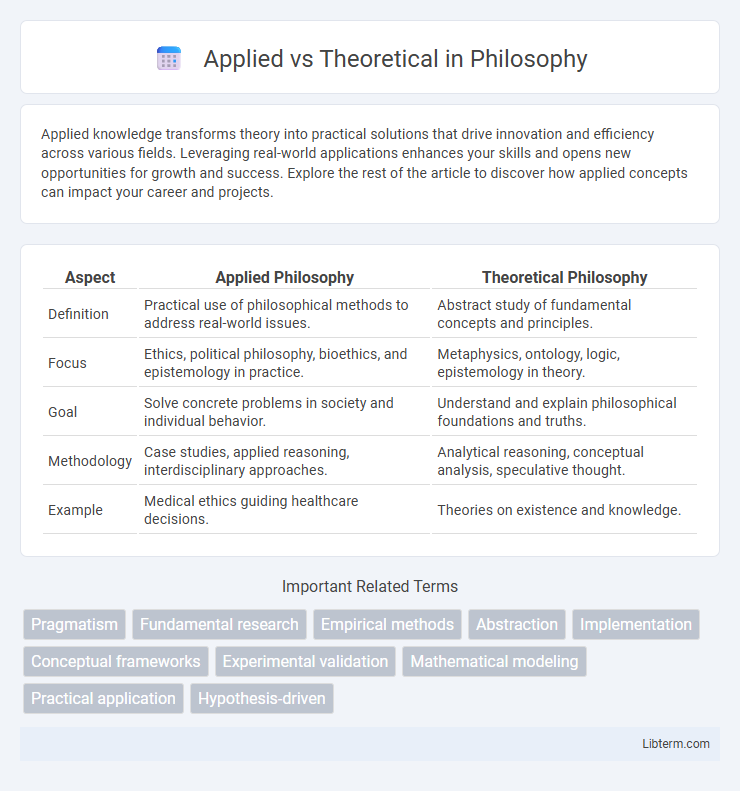Applied knowledge transforms theory into practical solutions that drive innovation and efficiency across various fields. Leveraging real-world applications enhances your skills and opens new opportunities for growth and success. Explore the rest of the article to discover how applied concepts can impact your career and projects.
Table of Comparison
| Aspect | Applied Philosophy | Theoretical Philosophy |
|---|---|---|
| Definition | Practical use of philosophical methods to address real-world issues. | Abstract study of fundamental concepts and principles. |
| Focus | Ethics, political philosophy, bioethics, and epistemology in practice. | Metaphysics, ontology, logic, epistemology in theory. |
| Goal | Solve concrete problems in society and individual behavior. | Understand and explain philosophical foundations and truths. |
| Methodology | Case studies, applied reasoning, interdisciplinary approaches. | Analytical reasoning, conceptual analysis, speculative thought. |
| Example | Medical ethics guiding healthcare decisions. | Theories on existence and knowledge. |
Introduction to Applied vs Theoretical Approaches
Applied approaches emphasize practical implementation and real-world problem solving, utilizing theoretical foundations to develop functional solutions across various disciplines. Theoretical approaches prioritize abstract models and conceptual frameworks to understand underlying principles and generate hypotheses for further exploration. Integrating both methods fosters comprehensive knowledge, enhancing innovation and effective application in scientific research and industry.
Defining Applied Methods
Applied methods involve practical techniques and procedures designed to solve real-world problems using empirical data and experimental validation. These methods prioritize implementation and measurable outcomes in fields such as engineering, medicine, and social sciences, differing from theoretical approaches which focus on abstract models and conceptual frameworks. Defining applied methods emphasizes tools like case studies, simulations, and field trials that directly address specific challenges and generate actionable results.
Understanding Theoretical Frameworks
Theoretical frameworks provide the essential foundation for applied research by offering structured concepts and hypotheses that guide the investigation of real-world problems. Understanding these frameworks enhances the ability to design experiments, interpret data, and derive meaningful conclusions that bridge abstract theory with practical application. Mastery of theoretical constructs ensures that applied methods are grounded in validated knowledge, improving the reliability and impact of research outcomes.
Core Differences Between Applied and Theoretical Practices
Applied practices focus on the practical implementation of knowledge to solve real-world problems, utilizing tools, techniques, and empirical data. Theoretical practices emphasize developing models, hypotheses, and abstract principles to explain phenomena and guide further research. Core differences lie in application versus conceptualization, with applied work prioritizing actionable results and theoretical work focusing on foundational understanding.
Examples of Applied vs Theoretical in Various Fields
In computer science, applied research includes developing software applications or cybersecurity protocols, while theoretical research focuses on algorithms and computational theory. In physics, applied examples involve engineering devices like solar panels, whereas theoretical work studies the fundamental principles of quantum mechanics. Medical fields show applied research through clinical trials of new treatments, contrasted with theoretical studies on disease mechanisms and molecular biology.
Advantages of Applied Approaches
Applied approaches offer practical solutions by directly addressing real-world problems, enabling immediate implementation and measurable impact. These methods facilitate experiential learning and skill development, enhancing the ability to adapt and innovate in dynamic environments. Emphasizing application over abstraction accelerates progress in industries such as engineering, medicine, and technology through tangible results and improved efficiency.
Benefits of Theoretical Exploration
Theoretical exploration deepens foundational knowledge by generating models and frameworks that explain complex phenomena, driving innovation across disciplines. It enhances problem-solving capabilities by uncovering underlying principles that guide applied research, leading to more effective and efficient solutions. Fostering critical thinking and creativity, theoretical inquiry stimulates new hypotheses and advances scientific understanding beyond practical limitations.
Challenges of Applied and Theoretical Work
Applied work often faces challenges related to practical implementation, such as resource constraints, real-world variability, and the need for immediate, actionable results. Theoretical work struggles with abstract problem-solving, conceptual complexity, and the difficulty of validating models without empirical data. Balancing these challenges requires integrating empirical feedback with rigorous conceptual frameworks to advance both fields effectively.
Integrating Applied and Theoretical Perspectives
Integrating applied and theoretical perspectives enhances problem-solving by combining practical experience with conceptual frameworks, allowing for comprehensive analysis and innovative solutions. The synergy between applied methodologies and theoretical models drives advancements in fields such as engineering, medicine, and social sciences by ensuring that empirical data validates hypotheses and that theory guides practical implementations. This integration fosters adaptive learning and continuous improvement, bridging gaps between abstract concepts and real-world applications.
Future Trends in Applied and Theoretical Research
Future trends in applied research emphasize integrating artificial intelligence and machine learning to solve real-world problems across industries such as healthcare, finance, and environmental science. Theoretical research is increasingly focused on advancing quantum computing and fundamental physics to provide a deeper understanding that will underpin next-generation technologies. Collaborative efforts between applied and theoretical domains are expected to accelerate innovation, bridging abstract concepts with practical implementations.
Applied Infographic

 libterm.com
libterm.com